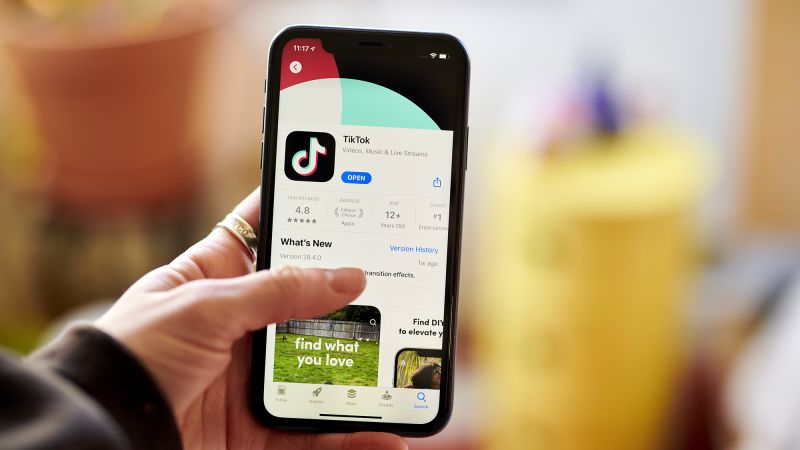TikTok – and some of its users – are pulling out all the stops to contest a bill that could lead to a nationwide ban of the app.
As House lawmakers prepare to vote on the bill Wednesday, TikTok is encouraging users to call their representatives with a full-screen notification about the legislation. The company’s CEO, Shou Chew, has attempted to schedule 11th-hour meetings with members of Congress. It sent letters to two lawmakers on Monday challenging their characterizations of TikTok’s call-to-action campaign as “offensive” and “patently false.”
And TikTok claims that banning the app would harm 5 million businesses that rely on the platform.
One of those businesses belongs to Nadya Okamoto, a TikTok creator with more than 4 million followers and whose brand of menstruation products, August, is carried by national retailers including Target. (TikTok connected Okamoto with CNN.)
Okamoto’s TikTok account features videos on women’s health, sex education and the occasional glimpse into her personal life. She’s launched product collaborations with major brands such as the trendy footwear company Hoka. Her sisters are TikTok creators in their own right, one of whom is using her income from TikTok to pay her own way through college, Okamoto said.
TikTok’s heavy emphasis on the For You page makes it far easier for brands like August to reach new audiences compared to other apps, Okamoto said. “They’re primarily looking at content from people they don’t necessarily follow already. And so, as a business, that is a very unique thing.”
Okamoto, who is Asian-American, also suspects that running beneath the anti-TikTok rhetoric is a strain of fear and racism, echoing many other Asian-Americans who have looked on with growing alarm.
“It feels like, in my gut, whether it’s Chew testifying or just lines of questioning or comments that have been made about why this bill is coming forward, that it is rooted in a lot of xenophobia, with not a lot of evidence behind some of the claims,” Okamoto said. “There’s this conflation of the app directly with the Chinese Community Party.”
Cybersecurity experts say that the national security concerns surrounding TikTok remain a hypothetical — albeit concerning — scenario. US officials have not publicly presented evidence that the Chinese government has accessed the user data of US TikTok users, an outcome that lawmakers say their bill is intended to prevent. US policymakers fear that China could compel TikTok’s parent ByteDance to hand over the data, which could help Beijing identify intelligence targets or conduct propaganda or disinformation campaigns.
Creators interviewed by CNN say they have not personally viewed any content on TikTok that could be described as Chinese propaganda, however.
“Just stop. It’s so tired,” said Grey Prnce, who together with her spouse, Grayson France, co-manages the TikTok account @officiallyverygay. “I’m more worried about the United States having my data.”
Walking around Times Square one day in 2021, Teddy Siegel came to the sudden and horrifying realization that’s befallen many a New York City visitor: She had to pee, and there was nowhere to go.
Siegel began ducking into stores and shops, pleading with rising desperation to use their private restrooms, until finally finding a McDonald’s that let her use the restroom in exchange for making a purchase.
To remember the bathroom’s location for next time, Siegel took a video of the McDonald’s and saved it to her phone. Thus was born @Got2GoNYC, a TikTok account that aims to map all the publicly accessible toilets in the city.
Siegel’s brand of open, self-deprecating humor and her all-too-relatable outrage over a universal human experience has helped her reach more than 185,000 followers on the app and roughly half a million followers across multiple platforms.
Siegel says Congress is threatening to undermine her mission to document a real public health issue — the lack of available restrooms in public spaces — and to help people from around the world find relief fast.
“[TikTok] has really helped me not only spark a movement, no pun intended, but to amplify this mission in a way that’s been able to make it so accessible,” Siegel said.
Siegel is one of a diverse group of TikTok creators speaking out against what they see as an unreasonable restriction on their speech and economic activity, highlighting how some of the platform’s users are vocally at odds with legislation US officials say will block the risk of spying by the Chinese government.
Multiple creators say the House bill that requires TikTok to find a new owner within several months or be prohibited from US app stores creates unrealistic deadlines for the social media company that would almost certainly disrupt the organic communities they’ve built and can’t be easily replicated elsewhere.
TikTok’s atmosphere is far more casual and authentic than on alternatives like Instagram, they say, and its recommendation algorithm is far better at expanding users’ horizons and helping them to discover new creators. Those advantages are why TikTok lends itself to community-building in ways that other platforms can’t match, they said, and why the company must be allowed to continue serving US users.
Prnce, who met her husband on TikTok, not only credits the app for her marriage but also says it’s helped roughly 50 queer Utah residents discover one another. Those people would not have met, Prnce said, were it not for a benefit event that @officiallyverygay held to support a struggling (now-closed) non-alcoholic bar in Salt Lake City. The only thing they shared in common? They all followed the same TikTok account.
Read the full article here
